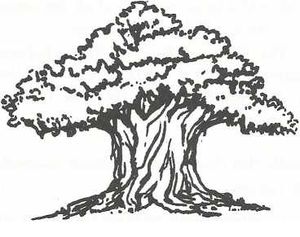By Swami Harshananda
Aśvattha literally means
- resting place of horses
- resting place of the swift
- the tree Ficus religiosa
- ‘that which does not last till the next day’
Aśvattha the tree[edit]
Aśvattha (Ficus religiosa) is one of the highly revered trees. It is said to have issued forth from Indra, the king of gods. According to another version of mythology, it is also a manifestation of Viṣṇu. Kṛṣṇa says in the Bhagavadgitā[1] that he is the aśvattha among the trees. Since the gods sit under a celestial tree,[2] holy men on the earth sit under this tree. Its shade is said to confer miraculous powers like understanding the language of animals or remembering former births. Childless women worship it and circum-ambulate it with the hope and faith of being granted children.
In the scriptures, the eternal tree of life is compared to an aśvattha, with the roots in heaven and branches spread below.[3][4][5]
The wood of this tree was being used to prepare sacrificial vessels and the upper araṇi (one of the two pieces of wood used for generating fire during Vedic sacrifices).
Works of Ayurveda like the Suśruta Samhitā describe its bark, roots and fruits as being endowed with medicinal properties.
References[edit]
- The Concise Encyclopedia of Hinduism, Swami Harshananda, Ram Krishna Math, Bangalore

